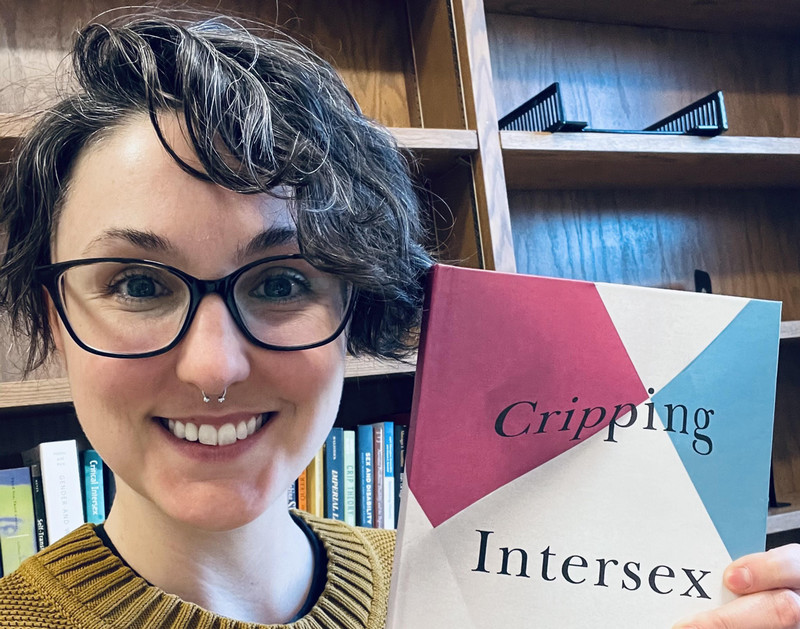Intersex Awareness Day: Dr. Celeste Orr and Cripping Intersex
Author: UNB Research
Posted on Oct 26, 2023
Category: Research , Publications

Today, October 26, is National Intersex Awareness Day, a day intended to highlight human rights issues faced by intersex people.
In recognition of this day, we're highlighting UNB's Dr. Celeste Orr, assistant professor of sociology and Wendy J. Robbins Professor in Gender and Women’s Studies.
Last year, Dr. Orr published Cripping Intersex (2022), in which they explore how interphobia and ableism converge to construct intersex traits as disabled, and how this is linked to a cultural perspective that only allows sex to be viewed as a binary.
Dr. Orr discussed their research, and the important need for continued advocacy and activism to fight discrimination, in a commentary published in Impact Ethics last October and reproduced here:
Intersex Awareness Day, coming up on October 26, offers the perfect opportunity for people to educate themselves on intersex human rights issues and join in the fight against interphobia, the systemic discrimination against intersex individuals, individuals with biological characteristics that defy the “male” and “female” sex binary.
To mark this day, I join the anti-interphobic chorus to combat one of the grossest human rights violations against intersex people, namely non-consensual genital surgeries, also known as intersex genital mutilation. I also seek to underscore the fact that ableism, queerphobia, and racism underpin intersex genital mutilation and interphobia broadly speaking. Intersex human rights issues are not distinct from other human rights initiatives.

Photo Credit: Wikimedia Commons/Morgan Carpenter and Intersex Human Rights Australia. Image Description: An intersex flag.
In my recently released book, Cripping Intersex, I explain that intersex people defy “compulsory dyadism”, which is “the instituted cultural mandate that people cannot undermine the sex dyad by possessing intersex traits”. The spectre of intersex “according to this mandate, must be exorcised”. One of these exorcising practices is intersex genital mutilation. This procedure is justified via ableist discourses. Intersex variations are typically understood to be disordered, diseased, or disabled by medical professionals, despite the fact that intersex traits themselves are not innately so and evidence presented that intersex traits threaten one’s health are inconclusive, inconsistent, and highly contested. Rather than being diseased or sick, “it is the culture around the child which is dis-eased, … made uneasy by the child’s intersex characteristics”. I posit that ableist rhetoric is mobilized to justify intersex genital mutilation procedures that, paradoxically result in short- or long-term disabilities such as, incontinence, anesthetic neurotoxicity, urethral strictures, chronic infection, genital pain, suicidal ideation, anxiety, depression, and post-traumatic stress disorder.
The medical diagnosis, “blind pouch vagina,” reveals the ableist and queerphobic logics of intersex genital mutilation. “Blind pouch vagina” is a diagnosis reserved for intersex people who have a vagina that is deemed too short or shallow. In an effort to make such a vagina “see,” vaginoplasties are often performed. These procedures “can cause infertility; … the constructed vagina can smell like a bowel; it can necessitate constant use of sanitary napkins; it frequently requires repeated surgical revisions”. I maintain, “The metaphor ‘blind’ provides us with quite a bit of insight into the ableist ideological underpinnings of these ‘curative’ practices. According to medical professionals and the broader ableist culture, blindness is a disabling lack or loss that must, if possible, be avoided or cured”.
What do these vaginas apparently need to “see”? As Laura Inter suggests, these vaginas are “blind” to heterosexual, penetrative sex. These intersex people do not conform to “compulsory heterosexuality” and, in turn, violate “compulsory able-bodiedness”. I argue, ableist logics are used to mask the queerphobia because ableism is typically not recognized as a form of discrimination. Ableism, and the idea that a future without a disability is innately superior to one with a disability, is presumed common-sense.
In addition to queerphobia and ableism, racist discourses have been overtly mobilized to justify interphobia, colonization, racist science, and intersex genital mutilation. As outlined by Zine Magubane, African and Black people were understood by white European colonizers as predisposed to being sexually “ambiguous” – a “fixed peculiarity of race”. Texts published into the twentieth century perpetuated this false idea. These beliefs impacted how intersex people were “treated” by doctors when intersex genital mutilation became common practice in the mid-twentieth century. Surgery on white intersex patients was deemed “imperative to establish the normality of whiteness. An ambiguously gendered white body needed to be corrected to retain its whiteness, whereas an ambiguously gendered black body was seen as confirming the essential biological difference between whites and blacks”. Intersex genital mutilation was presumed essential for white intersex patients so they could retain their legal rights as white people: “the right to inherit and own property, the right to vote, the right to marry, and the right to education. These social privileges were extended only to whites and, therefore, it was a political imperative that their bodies be identified as either male or female”.
Even if racist and colonial ideologies are not overtly mobilized now, the logics of interphobia, racism, queerphobia, and ableism interconnect and continue to fuel all sorts of violence. Hence, it is crucial to underscore the racist historical construction of sexual “ambiguity” and how that construction has maintained intersecting oppressive ideologies for centuries.
Hence, on Intersex Awareness Day, I believe it vital to echo Lynnell Stephani Long, Sean Safia Wall, and Pidgeon Pagonis (2016) who spearhead the Intersex Justice Project; their mission to “#EndIntersexSurgery” emphasizes that this mission is not distinct from “other movement groups…: reproductive justice, prison abolition, Black liberation, indigenous people’s rights and sovereignty, Latinx liberation, and other groups working toward freedom from oppression”.
More information
Dr. Celeste Orr| Department of Sociology | Faculty of Arts
Research at UNB | Graduate Studies at UNB | Postdoctoral fellowships
Cripping Intersex, published by UBC Press, will also soon be available to borrow from UNB Libraries.